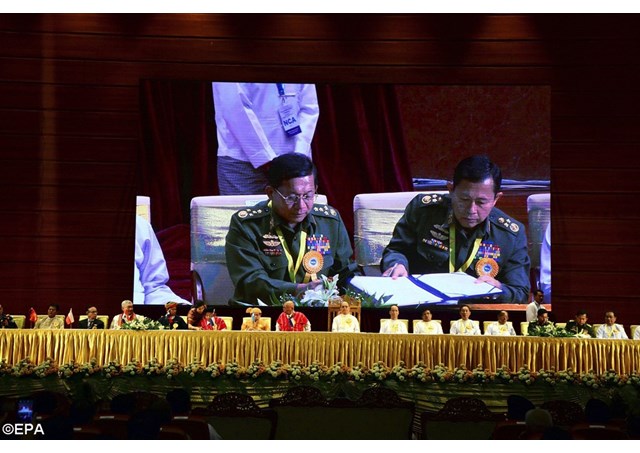
Myanmar: peace deal fails to ensure end to civil war

(Vatican Radio) The government of Myanmar has on Thursday, signed a ceasefire with eight national armed ethnic minority groups, in what was projected to be an attempt to put an end to decades of civil war in some areas of the country.
The ceremony was held in the capital, Naypyidaw, and was an apparent culmination of two years of negotiations forcefully held up by President Thein Sein as a trump card in view of elections next November 8. However, it is a partial result as seven other prominent groups have refused to sign the agreement.
The government is touting the signing of the national cease-fire agreement as an historic step toward peace. But analysts said the failure to include key combatants — including an armed group in a strongly Christian region — shows authorities have not delivered on a promise to end fighting ahead of highly anticipated November elections.
In a signing ceremony broadcast on state media with the official TV, President Thein Sein trumpeted the peace deal as a "legacy." The pro-government newspaper Global New Light of Myanmar dedicated headlines to the agreement, stating that "Peace begins now" thanks to "an agreement that will put an end to over 60 years of conflict."
At the ceremony attended by top representatives of the army and the leaders of the rebel militia, dressed in traditional clothing, Thein Sein said “The agreement represents the mutual trust between us, and a legacy for future generations. Furthermore, the agreement unequivocally shows our sincerity."
Earlier this week the government removed all eight ethnic groups who wanted to sign the agreement from the list of "illegal association", a decisive step to bring them within the fold of official politics. However, hopes for a peace plan including all ethnic minority armies vanished earlier this month, when various rebel groups walked out of talks because it did not include all those groups currently in conflict with the 'army.
Despite the president's optimism, however, large parts of Christian-majority Kachin state, in Myanmar's north, effectively remain in a state of civil war.
In a country of about 135 ethnic groups, peaceful coexistence has always been a struggle, especially with the central government, which is dominated by ethnic Burmese.
In the past, the ruling military junta used an iron fist against the groups least amenable to central control, like ethnic Kachin, who live along the border with China in the north, and more recently, ethnic Kokang in Shan state, where the president imposed a state of emergency.
The Kachin Independence Army, one of the largest ethnic armed groups in the country, is still fighting with military forces following the breakdown of a 17-year cease-fire in 2011. Scores of civilians have died and more than 100,000 people have been displaced as a result of the clashes and are forced into 160 refugee camps.
Observers said the conflict is a central reason for the government's failure to deliver on its promise to end armed clashes in Myanmar before the Nov. 8 vote.
Thursday's event was attended by representatives of China, India, Japan, European Union and United Nations. The agreement, however, could be short-lived, because the army continues to fight in some areas (particularly the Kachin territory in the north) ignoring government orders to stop the war.
Aung San Suu Kyi, leader of the main opposition party in Myanmar was notably absent from the ceremony today after she declined to support this peace agreement. The "Lady" also added that a true peace agreement on a "national" scale is one of the objectives of a future government led by the National League for Democracy (NLD).
Yan Myo Thein, a Yangon-based political analyst, said the fact that only some of the country's armed ethnic groups have signed the agreement shows it is more of a "cosmetic political show" rather than a historic benchmark. "The peace process must be inclusive of all ethnic armed groups," Yan Myo Thein said in an interview Oct. 15.
"The deal has also raised concerns about the sincerity of the government's attitude in not allowing some ethnic groups to be involved in the cease-fire agreement."
Among those included in the ceremony in the capital, Naypyidaw, was the Karen National Union, whose armed wings fought with the military for more than six decades until a 2012 ceasefire — though there have been skirmishes after as well.
Still, hundreds of thousands of Karen people live in refugee camps on either side of the Thailand-Myanmar border.
Tu Ja, a Catholic Kachin politician with the Kachin State Democracy Party, said that any meaningful peace agreement has to include all ethnic groups. Still, Tu Ja saw reason to be positive.
"I think other groups that didn't sign today need to make more discussions and can sign it later," said Tu Ja, who is also the former vice president of the Kachin Independence Organization, which is the political arm of the Kachin Independence Army. "I see today's signing as a beginning step and it must move forward. The crucial thing is to end fighting and make a cease-fire agreement."
In view of the situation, the country’s Catholic bishops issued a plea for a lasting solution to the conflict.
(Source: AsiaNews, UCANews.com)
| All the contents on this site are copyrighted ©. |


